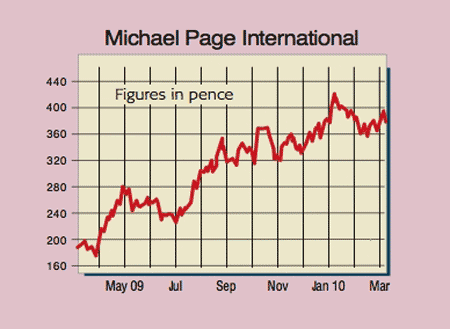
Faced with collapsing order books in late 2008 and early 2009, companies managed to slash wage bills quickly and protect profits by making redundancies and cutting employees’ hours.
The big question now facing shareholders in recruitment agencies such as Michael Page – a firm heavily reliant on fees from permanent placements (71% of gross profits) – is will recruitment bounce back?
And will those employees who have been put on part-time work be offered their full-time jobs again? If the answer is yes, then the firm could do very nicely given its global footprint (32% exposure to Britain, 47% to Europe, 12% to Asia and 10% to the Americas) and heavy weighting to the finance industry (50%). However, I’m not convinced.
Most economists and international trade bodies predict that the West, burdened by gigantic fiscal deficits, will have to cut public-sector debt and spending. That will only add to dole queues. Doubts about the recovery’s staying power will mean many companies will boost output by either offering extra hours to existing staff or taking on temporary staff.
Michael Page (LSE: MPI), rated a BUY by Deutsche Bank
So, given this muted backdrop, why have Michael Page’s shares doubled over the past 12 months? It is largely down to its operational gearing (high fixed costs boost profits when sales rise) and exposure to a very cyclical industry. This has attracted investors hoping that the FTSE rally has further to run from its March 2009 lows. There have even been unsubstantiated rumours going round that the firm may become a takeover target again, especially after rejecting advances from foreign rival Adecco at 400p back in 2008.
Michael Page is a decent business enjoying improving conditions in the recruitment market. At the preliminary results last Friday, chief executive Steve Ingham said that he had seen an increase in activity in all regions except in Great Britain. Speaking of the future, he then said: “Does it look like the sun is coming out? Yes.” Nevertheless, even he had to conclude: “Does that mean that it’s out forever? No.”
The City is predicting 2010 sales and underlying earnings per share of £733m and 9.2p, rising to £881m and 15.9p in 2011. This puts the shares on pie-in-the-sky p/e ratios of 42 and 24. I would value the firm on a through-cycle Ebita multiple of ten, assuming a sustainable margin of 12%. After adjusting for £137m of net cash, I get an intrinsic value of just 310p per share. So, with the jobs picture set to worsen, particularly if central bank stimulus programmes are withdrawn towards the end of 2010, it’s time to sell.
Recommendation: SELL at 385p
• Paul Hill also writes a weekly share-tipping newsletter, Precision Guided Investments